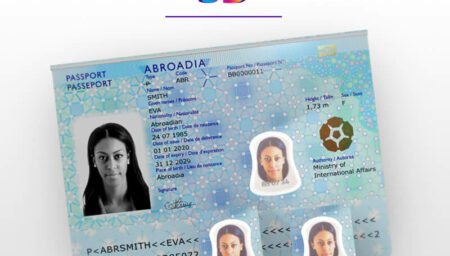Reinforcing ID document protection with LASINK™ 3D

 To find out more about ID documents, we caught up with IDEMIA’s VP Marketing, ID solutions, Caroline Jardon.
To find out more about ID documents, we caught up with IDEMIA’s VP Marketing, ID solutions, Caroline Jardon.
Over the last few years, the ID landscape has faced major transformations: the introduction of a chip in ID documents, the use of new materials – notably polycarbonate to increase durability and reinforce security, the widespread deployment of biometric, contactless and NFC technologies and the overall mobile and digital transformation. Since last year, this transformation has accelerated due to the worldwide pandemic – digital and contactless technologies have suddenly become much needed and very real. A foundational ID needs to adapt and evolve. The pandemic has pushed governments around the world to adopt a more modern stance on ID documents. This trend is called phygital – merging physical and digital. Digital documents are seeing a significant increase in their usage. Governments around the world have launched over 165 fully or partially digital ID schemes1. This increase shows that governments are confident in the positive impact a digital ID has on their respective country’s development. But we have to remember that digital and physical documents go hand in hand. Very often, a digital identity is created from a physical ID document. Why? Because an ID needs to provide the same level of trust and confidence in the digital world as it does in the physical world – it is official proof that you are who you claim to be. Using a trusted physical document is a solid basis to create a secure digital identity.
The primary change is the widespread availability of remote administrative services and the remote authentication of citizens’ identities using biometric technology. With a secure digital identity, people can do almost everything from the comfort of their home. They can work from home and they can access government and private sector services online.
IDEMIA is developing and deploying secure methods of verifying physical ID documents using a smartphone or verifying citizens’ identities remotely based on their biometrics. We are continuously investing in R&D so that we can produce new security features and mechanisms to create a solid link between the physical document and its new digital uses. The pandemic has been a catalyst in revealing the importance of these technologies and the place they have in a citizen’s life.
At the same time, the pandemic has demonstrated an indisputable trend. There has been an increase in contactless systems such as iris and fingerprint scanning on-the-go. We are also working on algorithms that recognize individuals even while wearing a face mask.
This regulation will effectively transform the European national identity market. Its aim is to harmonize all national identity documents within Europe in order to strengthen the security of identity cards for EU citizens, as well as residence permits issued to third country nationals. It is based on the three pillars of citizens’ daily uses: proving their identity, crossing borders and accessing remote services.
Once this regulation is in place, all identity documents will have to be ICAO2 compliant and contain a Machine-Readable Zone so that the holder’s data can be verified for travel purposes. Governments will also be able to leverage secure and smart ID cards to provide safer access to eGovernment and private sector services, and >allow citizens to enroll online for digital identity solutions.
Thanks to the contactless and dual interface in eID cards, citizens will be able to create their own mobile identity easily from the government-issued app, using the NFC functionality in their smartphone. They will be able to use their digital ID to securely access eServices through multi-factor authentication online and perform in-person verification. The online services could include tax declarations, accessing educational platforms, dematerialization of solicitor’s procedures, eVoting, eHealth etc. These new eServices will help citizens to facilitate their day-to-day lives, reinforce trust and security between citizens and service providers and create major economical savings for the government.
So, to summarize, the new regulation aims at strengthening security, reinforcing trust and offering new digital and travel experiences to citizens.
At IDEMIA, we believe innovation is key and we have the capacity to provide bespoke identity documents that match each government’s needs.
Going back to the three pillars of citizens’ daily uses mentioned earlier, security features, especially the security of the embedded software in the chip, is key in creating a trustworthy and reliable ID document. On the one hand, identity documents such as passports, identity cards and residence permits are supposed to last for at least ten years. And on the other hand, there is a growing concern for security erosion of embedded software due to the evolution of hacking and fraud. IDEMIA understands that the market needs long-lasting security products, which is why we provide operating systems that are natively designed to be upgraded in the field. We have developed an innovative and unique solution, the JPatch that updates our operating systems remotely. Updates can be done anytime anywhere, even after the issuance of ID documents.
This is one example of how IDEMIA listens, understands and creates innovations adapted to the market and client needs.
Furthermore, the security features of our ID documents combine fundamental and high-end unique elements such as LASINK™ secure color laser-engraved photo and/or Stereo Laser Image (SLI) technologies. LASINK™ is the perfect example of phygital innovation: it is more than a secure color photo, as it can be verified using existing border crossing document scanners or smartphones.
We have invested in cryptographic technology, embedded operating systems and we also provide the full scope of identity solutions, from enrollment to document delivery. Our comprehensive offer covers the whole identity value chain (identity management, biometric matching, document personalization, card management system etc.), and allows us to provide our clients with an end-to-end solution, including services, maintenance and knowledge transfer. IDEMIA masters all internal critical features of an ID program. We are recognized as a biometrics expert, and we manage, develop and integrate all system parts.
Our purpose is to listen, understand and deploy. We assess the needs of each client to define the types of ID product/system that would be the most beneficial for them. We create the design and the security concept of the documents. We then tailor the system including the enrollment stations, an ID database and a personalization system (centralized or decentralized).
If the government has opted for a BOT (Build, Operate and Transfer) model, we provide advice on the financing and operations, as well as support and maintenance.
Building a trusted national digital ID ecosystem that engages the private sector and citizens is essential. At IDEMIA, we accompany governments every step of the journey toward the creation of a modern eGovernment.
1 https://www.mckinsey.com/industries/public-and-social-sector/our-insights/how-governments-can-deliver-on-the-promise-of-digital-id
2 International Civil Aviation Organization
